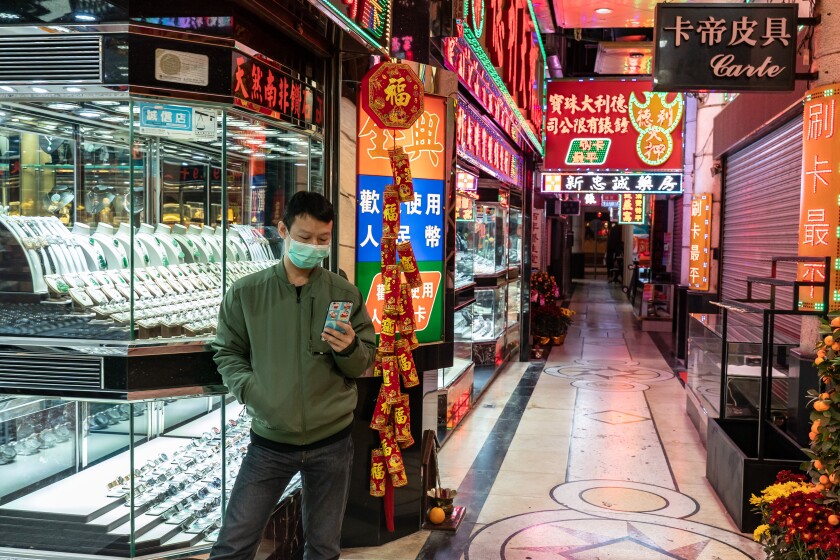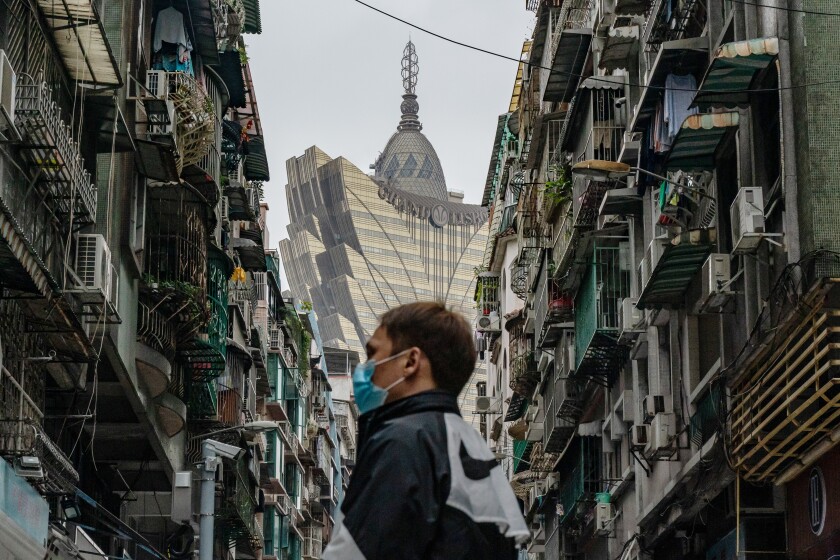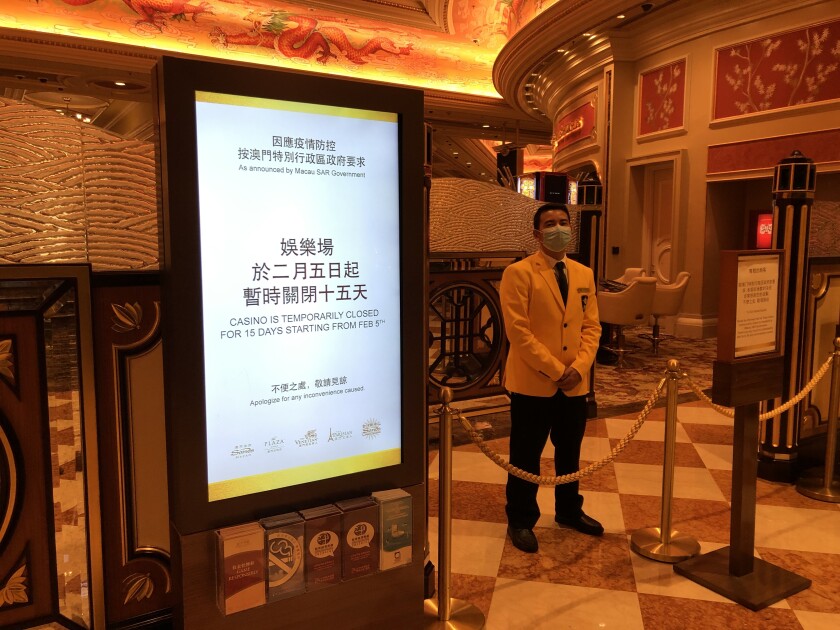The A-Ma Temple is ordinarily the first stop in the morning for buses filled with Chinese tourists, who flock to the 500-year-old site to light incense and pray for good fortune before hitting the casinos.
Swinging luck in one’s favor is paramount in the world’s gambling mecca, which is why the shrine offers a $375 joss stick as thick as a lamp post that takes two people to carry and looks like it needs a flamethrower to ignite.
On a recent weekday, however, the temple was barren apart from a custodian who guarded the green pagoda tiled entrance with a handheld infrared thermometer, making sure no would-be visitors exhibited signs of the deadly new strain of coronavirus.
Macao, which has 10 confirmed cases of the illness, isn’t on lockdown like cities across the border in mainland China. But the former Portuguese enclave has ground to a virtual standstill ever since the government took the unprecedented measure last week of closing the territory’s 41 casinos for half a month.
Hotels are locking their doors. Popular live shows are suspended. And the city’s notoriously seedy spas are shuttered, unheard of even during the worst typhoons.

A man wearing a protective mask looks at his phone as he stands outside of a jewelry store in a shopping district in Macao.
(Anthony Kwan/Getty Images)
More significantly, about $100 million is being lost each day by the gaming industry, which directly employs one-fifth of Macao’s labor force and provides the government with 85% of its tax revenue.
Gambling is so lucrative in the tiny jurisdiction — almost equal in size to Glendale and Burbank combined — that the government has given money away to residents since 2008. The so-called Wealth Partaking Scheme reached a record $1,250 last year.
“This is a historical moment because this is the first time the entire casino industry has closed its doors for more than 24 hours,” said Carlos Lobo, a local attorney who previously worked for the Macao Gaming Commission. “We don’t know what’s coming. So much of life here is connected to gaming.”
There’s no guarantee that the tourists will return when the likes of the Grand Lisboa, the Venetian and Wynn Macao restaff their tables and plug in their slot machines later this month. China, the source of 7 out of every 10 visitors to Macao, remains steeped in crisis.
The uncertainty adds one more unpredictable element to a somewhat fraught period in Macao. In less than two years, the Chinese territory will issue new gambling licenses for the first time in two decades. The last time was when a gaming monopoly was wrested from local tycoon Stanley Ho.

A man wearing a protective mask walks across a street in front of the Grand Lisboa Hotel in a residential district in Macao. The Macao government announced it would close casinos for two weeks after a hotel worker was infected.
(Anthony Kwan/Getty Images)
Jockeying has already begun. The city’s six license holders, including the three American subsidiaries, Sands China, Wynn Macau and MGM China (a joint venture between MGM Resorts and Ho’s daughter, Pansy Ho) have enthusiastically supported the government’s efforts to contain the virus. They’ve each pledged millions to combat the epidemic and continue to pay employees during the casino shutdown.
None can afford to run afoul of the government, local gaming experts say, and risk missing out on a gambling market worth $36.5 billion last year, which is more than five times the size of Las Vegas. MGM counts on Macao for about one-fifth of its revenue, Wynn one-third and Las Vegas Sands nearly two-thirds.
“Casino operators have now given a strong signal to the government that they are willing to sacrifice revenue for greater societal cause,” said Desmond Lam, an expert on gambling resorts at the University of Macau. “This reflects well on them and potentially on the renewal of their licenses.”
Speculation abounds in Macao that the souring relationship between Washington and Beijing over the trade war could cost the U.S. operators, who collectively employ about half the city’s casino workers.
That makes Beijing nervous at a time when Macao — in contrast with nearby Hong Kong — is being held up as a model of the one-country, two-systems principle.
The special arrangement, which was first introduced in Hong Kong in 1997 and then Macao two years later when Portugal relinquished authority, ensures the city of 600,000 maintains some autonomy from China such as separate legal and financial systems.
Macao has traditionally proved to be more pliable to China’s interests, a function of its diminutive size and the often uninspiring resistance the Portuguese put up against mainland influence.
It’s a legacy that could ultimately affect the bottom line of the world’s largest gaming company, Las Vegas Sands. Despite helping develop Macao into a global gambling destination early on, local analysts say Beijing’s creeping authority could result in extra scrutiny of the company because its owner, Sheldon Adelson, has been one of President Trump’s most ardent backers.
“If any American operator were to lose a license or not successfully win a new license, it would be Sands,” said Eric Coskun, director of casino projects at IGamiX, a Macao-based consultancy.
Sands and Wynn declined to comment. The Macao government and MGM did not respond to requests for comment.
There will be ample competition when bidding begins, including from Malaysia’s Genting, a major international hospitality and gaming brand, and Macao’s Suncity Group, a so-called junket operator that caters to high rollers and has been accused of running illegal online betting.
Suncity’s bid to clean up its image highlights how much Macao has tried to shift away from hard-core gamblers in favor of mass market tourists. That’s at Beijing’s behest, which wants to clamp down on money laundering through the casinos’ VIP rooms.
Operators who introduce attractions that visitors to Las Vegas are accustomed to such as thrill rides, live shows and conference facilities are in better standing with authorities.
The effort appears to be working. The share of Macao’s gambling revenue derived from high rollers has dropped from about three-quarters several years ago to less than half today, Coskun said.
No property better reflects that bid to capture the mainstream market than the Sands-operated Venetian Macao, a 3,000-room behemoth in the heart of the casino resort district known as the Cotai Strip. The faux-Italian building modeled after its sister property in Las Vegas houses the world’s largest casino, measuring 540,000 square feet.
Security guards wearing blue surgical masks and mustard blazers guarded the entrances to the sprawling gaming floor last week where rows of tables and slots sat untouched. Elsewhere in the complex, stores remained closed and gondolas were moored to the side of an ersatz Venetian canal — all while Patti LaBelle’s “Lady Marmalade” played over the resort’s sound system to mostly cleaning crews lugging vacuum cleaners.

A security guard blocks the entrance to the Venetian Macao’s gaming floor to comply with the territory’s 15-day shutdown of casinos to stop the spread of the new strain of coronavirus.
(David Pierson / Los Angeles Times)
Across the street at the Galaxy Macau complex, hotels used to having nearly full occupancies such as the JW Marriott doted on the handful of remaining guests. The desolate 1,000-room property, which shuttered all but one of its dining areas, had the eerie feel of a luxury Overlook Hotel.
All across the city, which clings to the edge of the Pearl River Delta, business has been upended by the coronavirus. Lines for Portuguese egg tarts that used to take 30 minutes to clear no longer exist. A famed steamed custard shop near the historic Senado Square had only two customers one afternoon.
At the ruins of St. Paul’s, a public address system urged visitors in Chinese, Portuguese and English to leave.
“The epidemic has reached a critical moment,” it sounded. “Please stay at home. Don’t assemble.”
Only the Macau Military Club, a salmon-colored colonial building that houses a private club, seemed to still attract steady customers — mostly members of Macao’s shrinking Portuguese community coming to dine on traditional dishes like Bacalhau à bras, a casserole of salted cod, potatoes and egg.
Casino worker Irving Cheong is reluctant to venture outside and chance getting sick. The self-described butler for gamblers at Suncity’s 16 VIP rooms in Macao has been holed up in his apartment watching Netflix and YouTube. His company’s CEO, Alvin Chau, posted a video to staff trying to reassure them the crisis would pass. Nonetheless, Cheong worries about losing his $4,500 a month job if the outbreak drags on.
“I don’t know what’s going to happen,” said Cheong, 24, who has a stable of clients in China, including one quarantined in Wuhan where the new strain of coronavirus first appeared. “Macao doesn’t have another industry to support the economy. That’s why fresh graduates just go into the gaming industry or try and get a job with the police or government.”
Jane Ng reluctantly took a job minding slot machines at the Hong Kong-owned City of Dreams casino four years ago after realizing she couldn’t afford to retire comfortably as the cost of living kept climbing in Macao.
The 56-year-old, who like most native residents primarily speaks Cantonese, had to teach herself passable Mandarin to communicate with the mainland visitors.
With money tight, she briefly panicked when the city’s chief executive first announced the casino closures. But City of Dreams quickly informed staff that their paychecks would keep coming.
“I was so happy when they said we’d still be paid,” said Ng, who has been passing the time by playing mah-jongg at home with family. “We all thought it was because of the licenses. In this disaster, the casinos are very willing to cooperate.”
Read more https://www.latimes.com/world-nation/story/2020-02-10/macao-casinos-shutdown
| < Prev | Next > |
|---|






 Copyright © 2025 ToCasino.net Online Casino. All Rights Reserved. Designed by
Copyright © 2025 ToCasino.net Online Casino. All Rights Reserved. Designed by